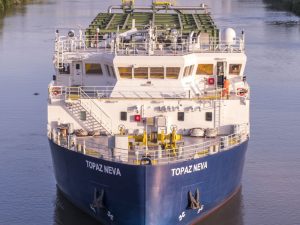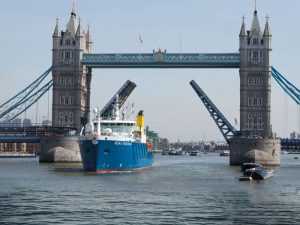The outcome of an acquisition and a subsequent merger, P&O Maritime Logistics is now uniquely positioned and empowered to offer its customers a wide portfolio of value-added marine services including integrated and offshore logistics for energy companies.

A new star has risen in the integrated maritime and offshore logistics firmament. In July 2019, Topaz Energy and Marine was acquired by DP World, and in Q4-2019 merged with P&O Maritime to create a new fortified entity—P&O Maritime Logistics (POML). The union has further consolidated both the expertise and capabilities of both companies.
The joining of professional forces has strengthened the overall P&O brand which brings with it endurance and a legacy of more than 180 years of maritime history. With this, POML is uniquely positioned to offer customers a wide portfolio of value-added marine services including integrated logistics based on advanced data analytics.
Offering a distinctive value proposition to customers, POML will focus on a triad of strategic segments–Offshore, Port Services and Logistics–delivering world-class capabilities across industries, with safety and the environment at the forefront.
A core focus for POML’s will be the further optimisation of offshore logistics for energy companies. With the company’s very robust track record, global clients, diverse assets and knowledge of its customers’ operations, POML is uniquely positioned to continue disrupting this part of the supply chain.
LogisticsGulf.com (LG) recently interviewed René Kofod-Olsen, the newly appointed CEO, P&O Maritme Logistics and the former CEO, Topaz Energy and Marine.
In a wide-ranging engagement with LogisticsGulf.com, Kofod-Olsen affirmed that “through the synergies created by the merger of the two companies, under the DP World umbrella, the POML business is well positioned to grow and build further scale and value for customers and shareholders alike.”
LogisticsGulf.com (LG): What implications—immediate, short and long-term does this acquisition and new entity (POML) have for the logistics sector in general and energy logistics in particular?
René Kofod-Olsen (RKO): The offshore sector plays a vital role in the energy industry and is in a state of anticipated recovery, with 2020 likely going to be another challenging year. Oil companies, over the past few years, have underinvested due to low oil prices, and investments are now increasing to meet the rising demand–both on new assets and importantly on the maintenance of existing assets which will have an effect on the energy logistics sector.
 With this increased demand, industry players also need to invest in their portfolio of services as customers now want a handful of select, trusted, suppliers who can provide much more than one single service. A key challenge for industry players has been the ability to offer our customers a wide portfolio of value-added marine services as our clients’ demands evolve and shift towards a need for a range of services and solutions.
With this increased demand, industry players also need to invest in their portfolio of services as customers now want a handful of select, trusted, suppliers who can provide much more than one single service. A key challenge for industry players has been the ability to offer our customers a wide portfolio of value-added marine services as our clients’ demands evolve and shift towards a need for a range of services and solutions.
In this lies our value proposition, as POML is strategically positioned to provide a wide portfolio of services to our customers, be it within a unique segment such as offshore or port services, or an integrated logistics offering with a combination of services. Owing to the integration between the two companies, we will be able to offer it all and drive value for our customers across all seven continents, delivering a difference that matters.
A core focus for POML – which has the potential to radically transform offshore logistics – will be the further optimisation of such offshore logistics for energy companies. With the company’s very robust track record, global clients, diverse assets and knowledge of its customers’ operations, POML is uniquely positioned to continue disrupting this part of the supply chain.
LG: How have the corporate and professional synergies acquiesced between the two entities—Topaz and POML?
RKO: Both Topaz and P&O Maritime were strong, profitable businesses ahead of the merger. Both entities complement each other very well, and the combined POML business is well positioned to grow and build further scale and value for customers and shareholders alike.
Historically, we have never strived to have the most ships, but we do strive to make the biggest impact for our customers and deliver solid returns for all our key stakeholders, and I am honored and humbled to steward one of the most historic names in the maritime history, the P&O brand, as we expand on our service offering and enter this new chapter.
LG: What are your priorities for POML?
RKO: Our customers are the absolute priority in everything that we do and I’m adamant that whatever activities and projects we undertake, they must contribute to making life easier or better for our customers – otherwise we won’t do them.
On a strategic level, a core focus for POML will be the further optimisation of offshore logistics for energy companies. With the company’s very robust track record, global clients, diverse assets and knowledge of its customers’ operations, POML is uniquely positioned to continue disrupting this part of the supply chain.
LG: Expand on the scale factor as a result of the merger?
RKO: P&O Maritime Logistics is strategically positioned to provide a wide portfolio of services to our customers, be it within a unique segment such as offshore or port services, or an integrated logistics offering with a combination of services. Owing to the integration between the two companies, we will be able to offer it all and drive value for our customers across all seven continents, delivering a difference that matters.
LG: What are the USPs and strengths of the new POML?
RKO: Our industry is constantly changing and evolving. Customers now want a handful of select, trusted, suppliers who can provide much more than one single service. P&O Maritime Logistics will focus on three key segments – offshore, port services and logistics.
What distinguishes us in the industry is our unique value proposition and our ability to offer our customers a wide portfolio of value-added marine services and to integrate these offerings – always with safety and the environment at the forefront.
With the establishment of P&O Maritime Logistics we now have an organisation that can deliver world- class capabilities across industries – be it our core focus areas of energy, transportation or port logistics customers.
LG: What are your expansion plans?
RKO: A core focus for POML will be the further optimisation of offshore logistics for energy companies. With the company’s very robust track record, global clients, diverse assets and knowledge of its customers’ operations, POML is uniquely positioned to continue disrupting this part of the supply chain and growing with our clients through this.
We have never aimed to have the most ships – we do, however, strive to make the biggest impact for our customers and other stakeholders with each ship in our fleet.
LG: How do you assess your role in your new position as CEO, POML?
RKO: Following DP World’s acquisition of Topaz and its merger with P&O Maritime, I have been asked to lead the consolidated global company-P&O Maritime Logistics. I am both honoured and humbled to have been selected to lead the company through its next phase of growth.
Having held leadership roles in the shipping industry for more than two decades, I have a clear idea of how I want the company to run, and my aim is that we exhibit empowered leadership in every role throughout the organisation – whether it’s leading other people, projects or specific activities.
In a nutshell I believe that with an equal portion of the following three ingredients; solid judgment, acute situational awareness and empathy, there are few situations one will not be able to navigate through. These are my leadership beacons, and it’s how I hope we can continue to sail our business forward.
LG: You have appointed a core team of four high-powered executives to constitute the ‘Executive Committee’. What is your mandate for the Committee?
RKO: I have appointed an Executive Committee of four excellent individuals, who are each responsible for one of the major functions of the company and who support me in managing the day-to-day operations of POML’s business.
LG: Where (which geographies) specifically do you foresee growth opportunities and why?
RKO: Whilst the company is headquartered in Dubai, POML has operations globally. Each market presents a different opportunity for us, and since our focus is in three service segments – offshore, port services, and logistics–we are well positioned to add value to our customers across all seven continents.
Within offshore, I have previously stated that we see significant opportunities both in the Caspian, Africa and in the Middle East, which we are very excited about. We are also excited to be growing our subsea business, primarily focusing on the inspection, maintenance and repair segment of that market.
A core focus for POML will be the further optimisation of offshore logistics for energy companies. With the company’s very robust track record, global clients, diverse assets and knowledge of its customers’ operations, POML is uniquely positioned to continue disrupting this part of the supply chain and growing with our clients through this.
LG: What role will new and emerging technologies play in POML’s operations?
RKO: We realised, a long time ago, that the entire industry needed to change and started by changing our own perspectives. We needed to diversify investment into our own businesses, in order to remain relevant, and create value. Our customer demands are increasingly shifting towards advanced services, and in response we began to digitise aspects of our service offering and built advanced algorithms to optimise the supply chains of our customers.
 For example, by having real-time visibility of vessel locations and applying advanced routing systems, we are able to provide our clients with better, more reliable updates on delivery of cargo. This has optimised their supply chain by improving project scheduling, reducing downtime and the need for manpower and support services.
For example, by having real-time visibility of vessel locations and applying advanced routing systems, we are able to provide our clients with better, more reliable updates on delivery of cargo. This has optimised their supply chain by improving project scheduling, reducing downtime and the need for manpower and support services.
Additionally, we have worked with several of our key customers to integrate data into their systems, also allowing us to learn more about our customers, thereby enhancing our service offering to cater to even more aspects of their businesses.
Digital is disrupting companies from their service offering through to their operations and maintenance. From customer dashboards providing customers real-time insight into the state of their operations, to the use of ‘Internet of Things’ to learn more about the state of our vessels, we see IT as a driver of both the topline and of cost reductions.
Having continuously invested in the IT of our fleet, we are now reaping the benefits – and so are our customers. Beyond the benefits I’ve already discussed, being able to manage maintenance of our fleet based on the condition of the machinery, we are able to improve technical uptime and operational stability, as well as reduce costs.
Last year, we teamed up with GE Baker Hughes to pioneer lube oil analysis in the marine space. This analysis can tell us a great deal about the condition of our ships – from detecting the presence of water and foreign particles, to changes in temperature, which can give insight into the likelihood of equipment failure in the motor, gearbox and propellers.
While it previously could take up to six weeks to receive results from a lube oil analysis, with digitisation, this process can now take place in real time, enabling maintenance to become predictive, which in turn leads to a reduction in unscheduled downtime and repair work.
LG: Your fortunes are inextricably linked with the energy sector. What is your take on the energy sector with regard to the regulatory mechanisms, ecology concerns and geopolitical developments?
RKO: The OSV (offshore support vessel) survivors of the recent downturn, include those organisations that were willing and able to make changes to reset their businesses and strategies to a new market.
In the past, for example, we would generically charter out our vessels on a day rate, generally for a short duration of time, and had limited control over routing or cargo. Since 2012, we moved further away from this strategy, and we accelerated those change strategies at the outset of the current downturn in anticipation and to remain in control of our own future.
We aggressively reduced costs, but also dared to position ourselves to be an even stronger partner to our clients – moving with them in the rapidly-changing marketplace to add value through distinct, more tailored services and solutions.
Our transformation was tough – we had to change the mindset of our entire organisation in parallel with just surviving – but I believe it provided us with the foundation for a competitive edge. That is how we adapt to the offshore energy sector, and it is how we will survive.
On the energy sector as a whole, the world needs to realise that the offshore energy sector will be around for many decades to come – also servicing the hydrocarbon industry, as oil and gas will remain part of the energy mix for many years. I believe that we need to encourage an informed debate about exactly that – the energy mix.
We certainly want to move towards renewable sources of energy, but at the same time need to cater for a growing demand for energy around the world. In this balance, we need to move away from the most carbon intensive fossil fuels – for example coal – and move to cleaner sources such as gas, while the whole energy infrastructure of the world transforms and scales up for renewables.
René Kofod-Olsen
Chief Executive Officer of P&O Maritime Logistics (POML)
René has over 23 years of experience in the marine industry, having worked in the A.P. Moller-Maersk Group and as CEO of Svitzer Asia, Middle East & Africa. He has held several leadership roles across a variety of multi-cultural organisations and countries. He has also completed an advanced management programme at Harvard Business School.
